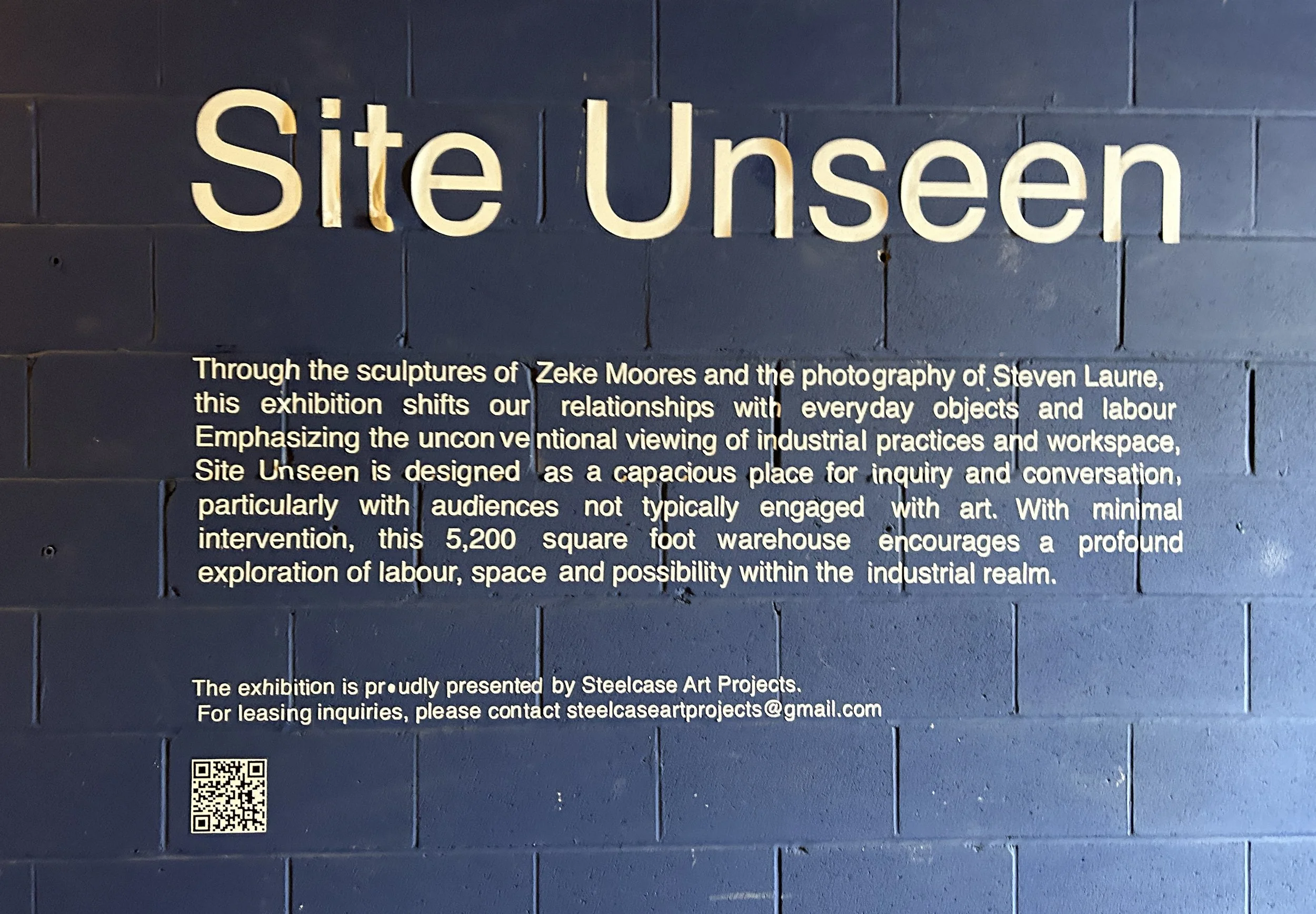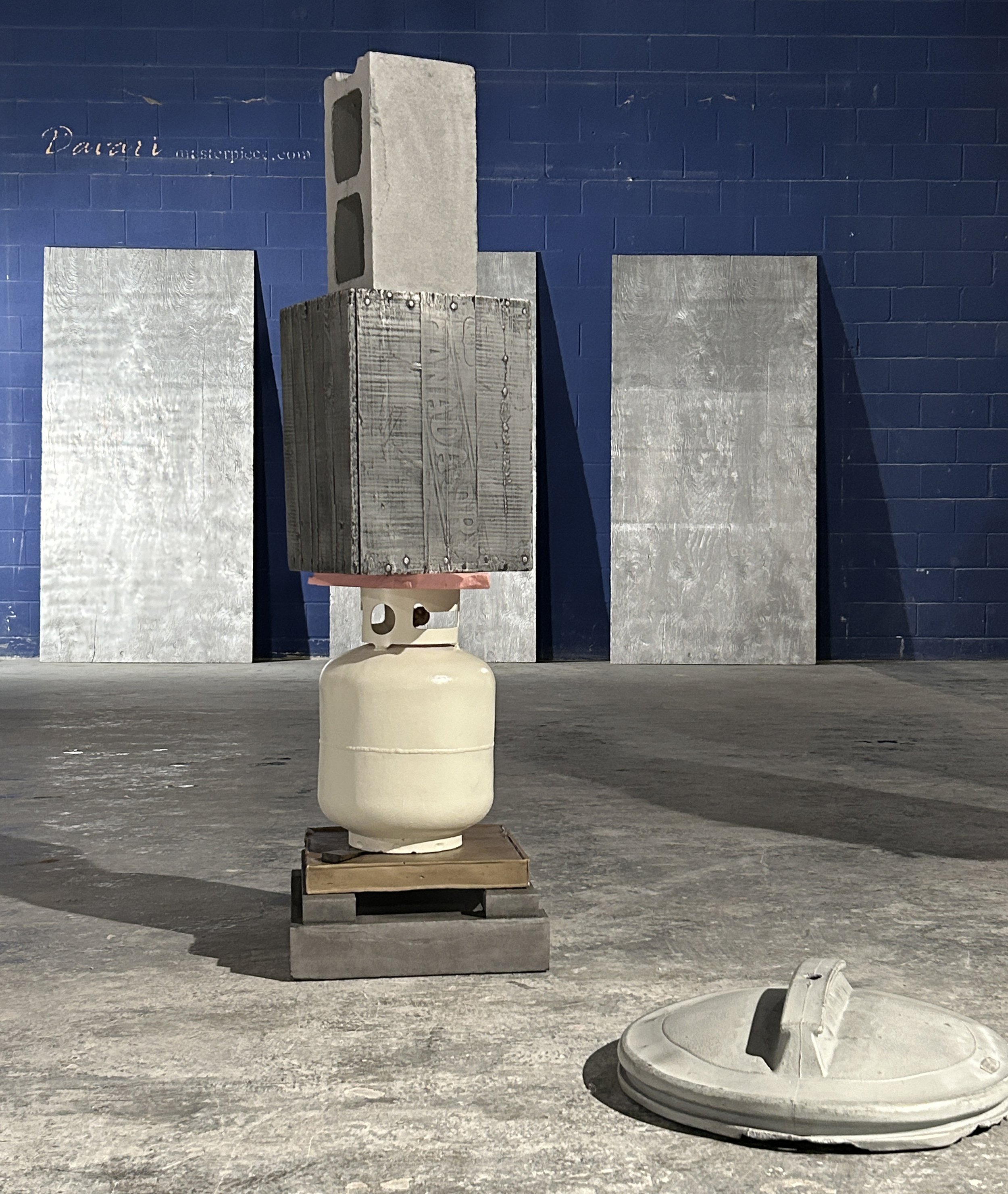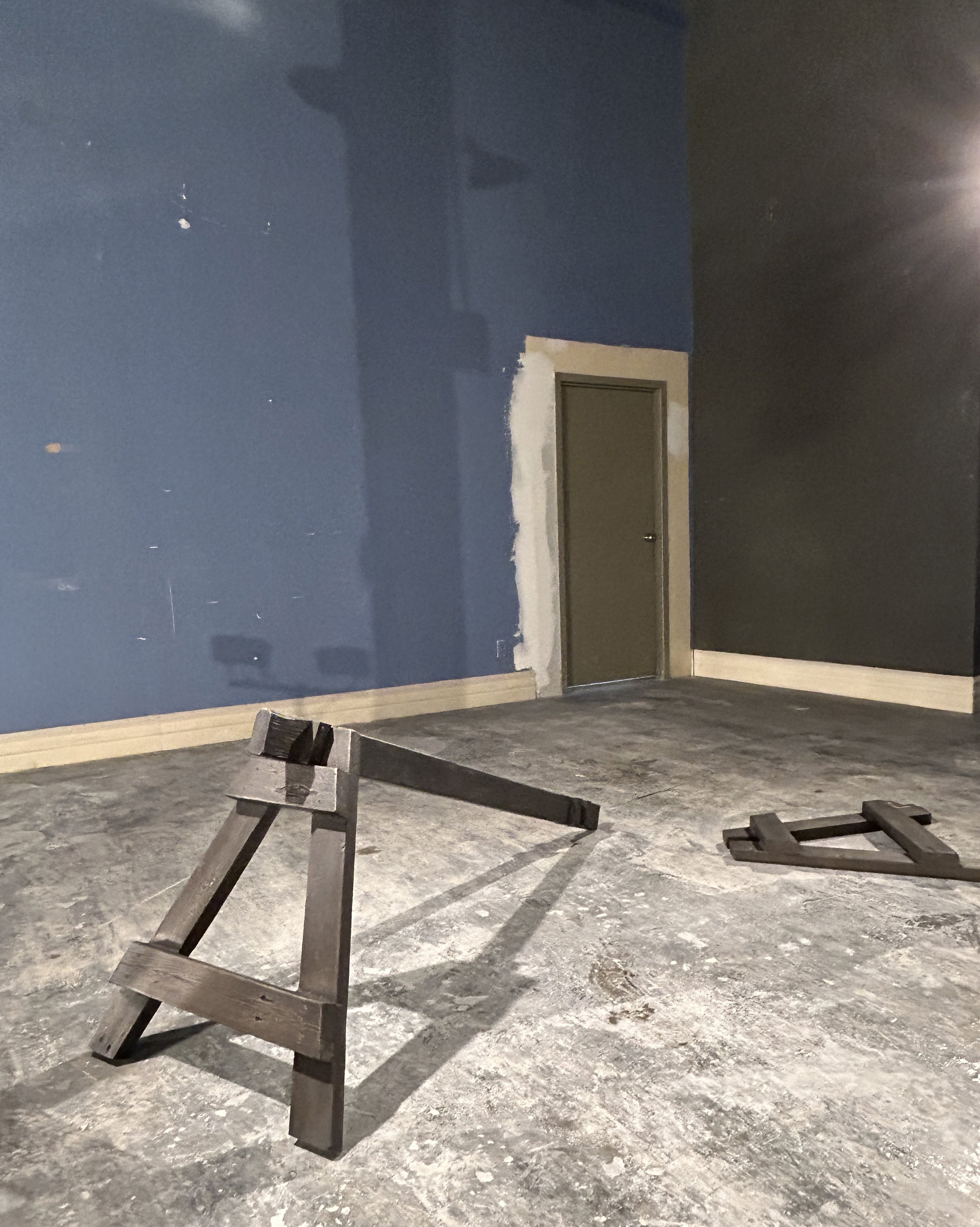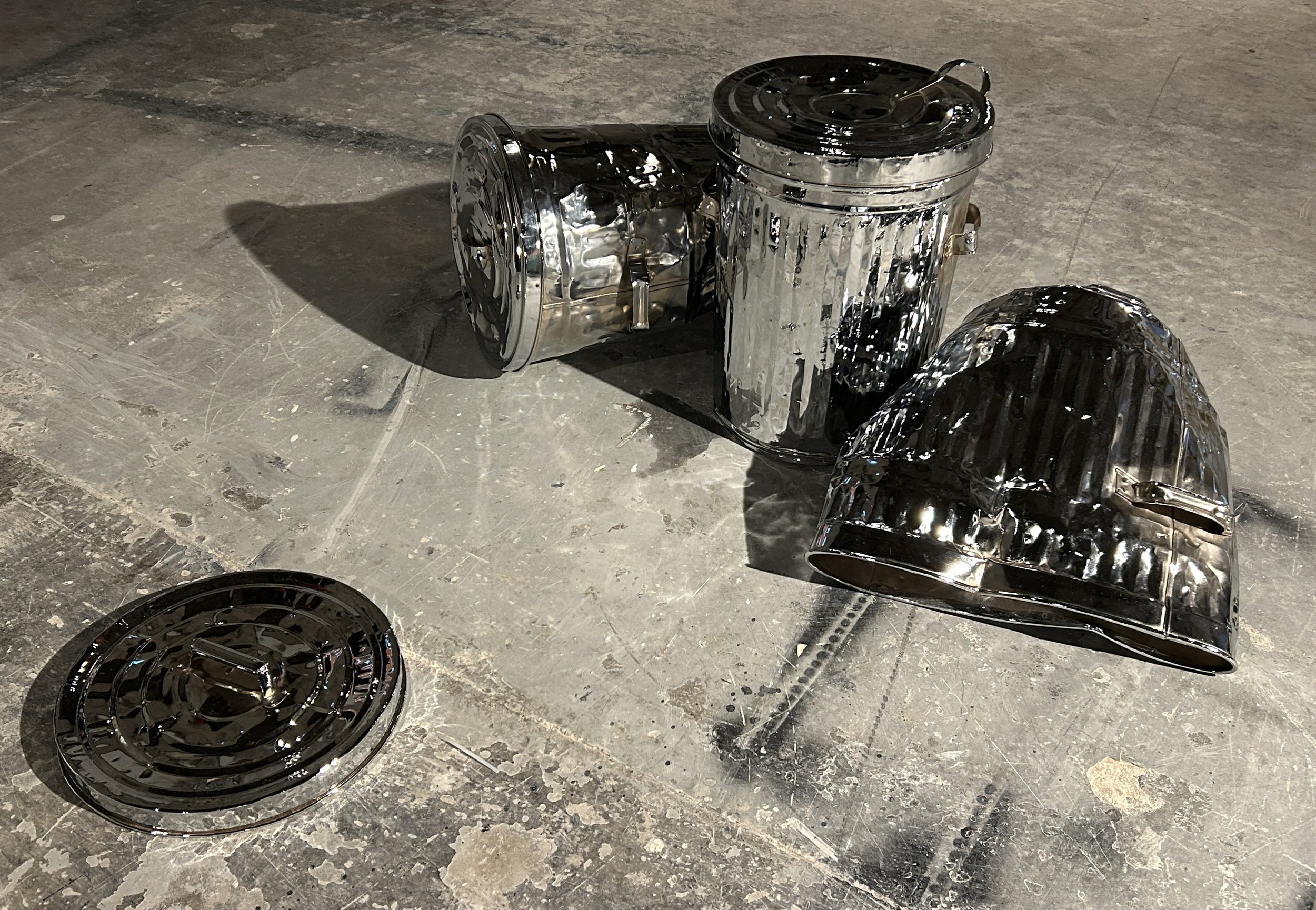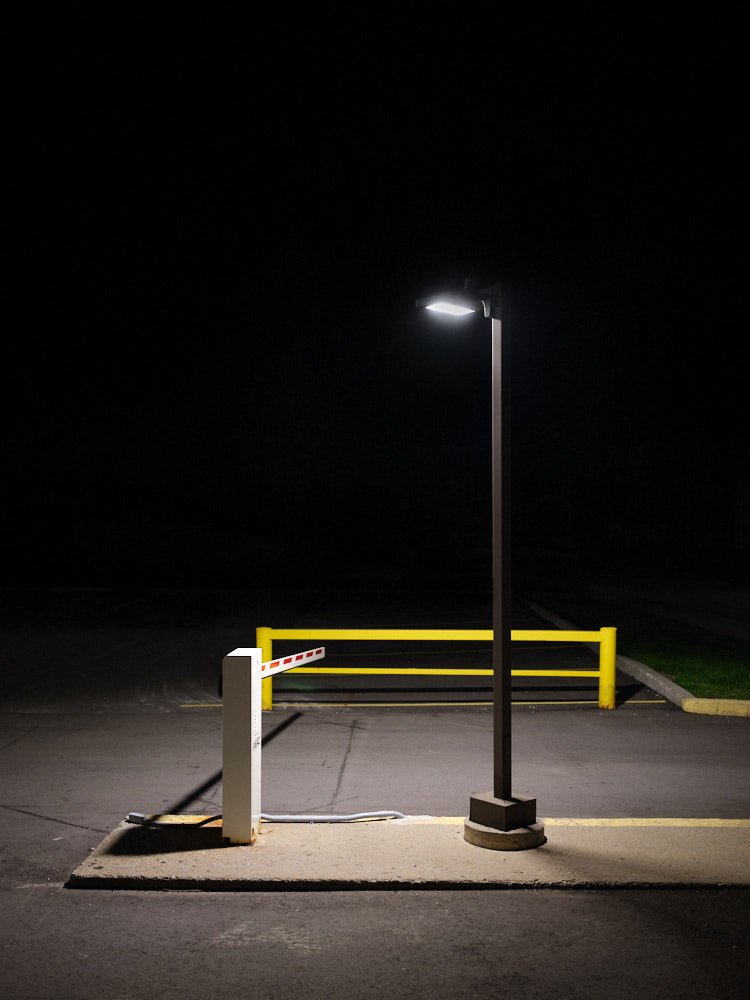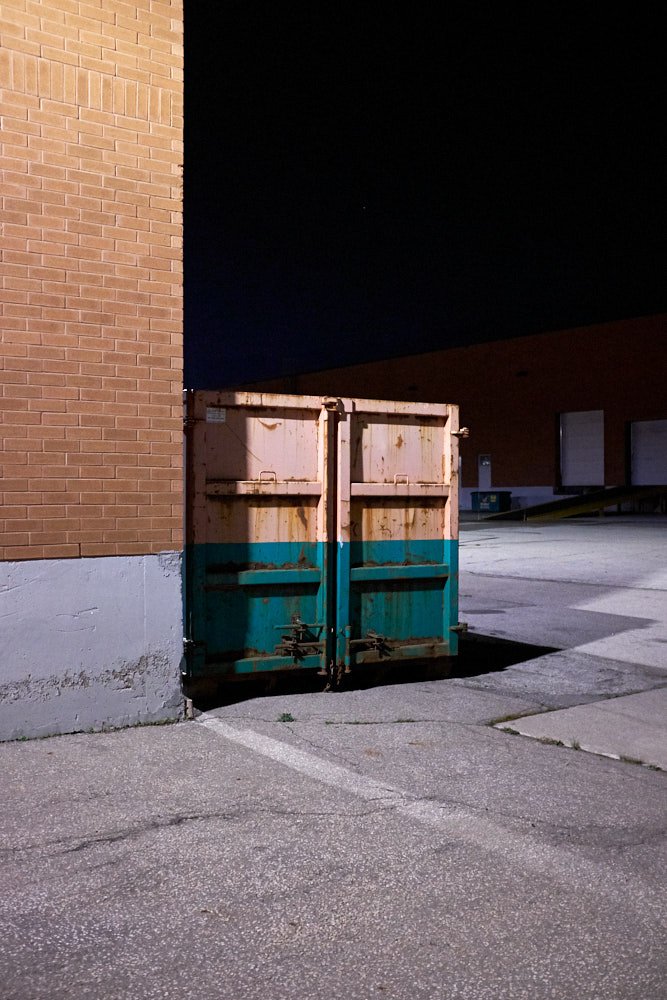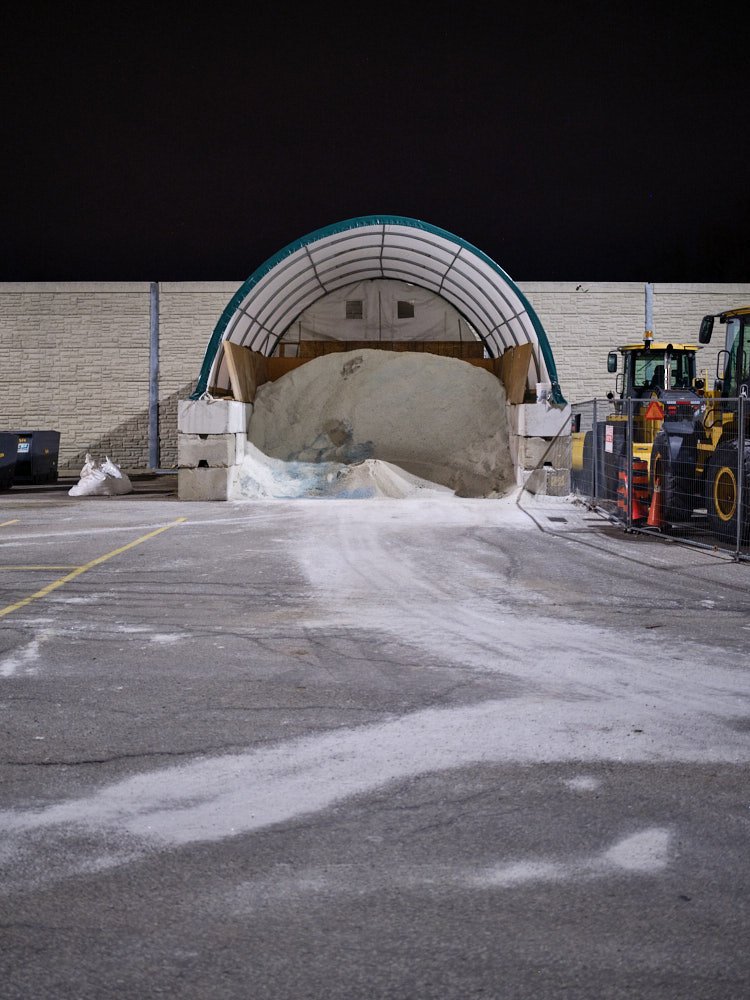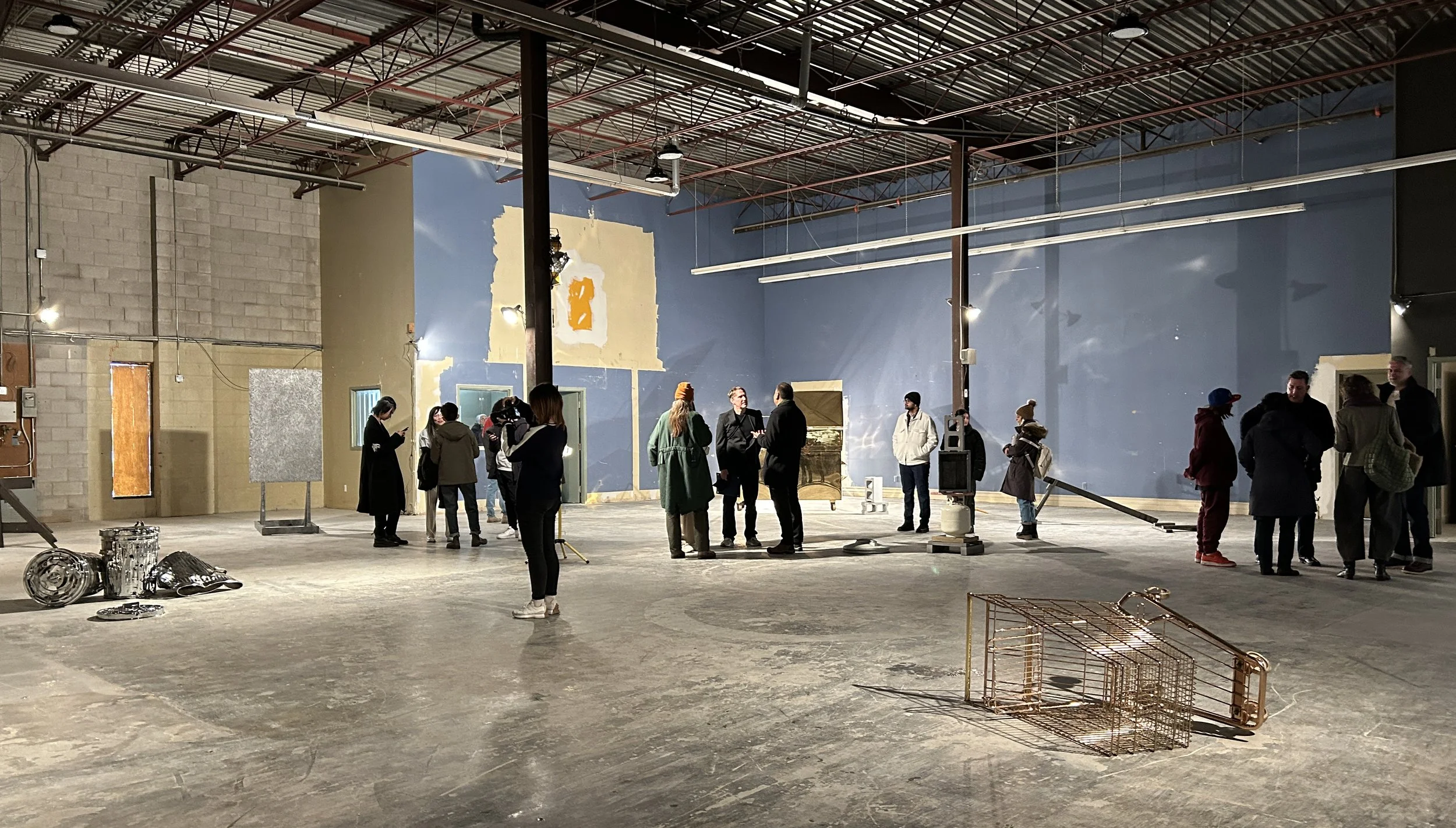By Steven Frank
Having curated exhibitions outside the gallery system over decades in Oshawa utilizing vacant space, the Site Unseen exhibition, in one of the Steelcase Road industrial buildings in Markham, was a must-see for this reviewer. Whitby artist Steven Laurie, along with Windsor-based Zeke Moores, share a special affinity for finding beauty in unusual places and their shared interest in exploring the banal and how humans make their mark has brought them together in a perfect environment to showcase their work.
Zeke Moores installation view
In this particular presentation, Zeke Moores is the sculptor and Steven Laurie is the photographer, but it is important to note that Laurie has a background in sculpture that explores the use, or albeit, misuse of machines within the social dynamics of leisure and labour. So it really makes for a natural pairing.
Curator Yuluo Wei explains the intent of the pairing with the space:
“Site Unseen challenges and transforms the viewer’s perception of industrial processes by highlighting the creative potential of often overlooked objects and spaces. Through the sculptures of Zeke Moores and the photography of Steven Laurie, this exhibition shifts our relationships with everyday objects and labour. Emphasizing the unconventional viewing of industrial practices and workspace, Site Unseen is designed as a capacious place for inquiry and conversation, particularly with audiences not typically engaged with art. With minimal intervention, this 5,200 square foot warehouse encourages a profound exploration of labour, space and possibility within the industrial realm.”
Steven Laurie photo Installation
Laurie’s photographic work is informed by the New Topographic movement that was best defined in a groundbreaking exhibition almost 50 years ago in Rochester. Images by Robert Adams and Lewis Baltz, among others, are often devoid of people and focus on the clash between the natural world and the altered landscape. Laurie delves further into the realm of human-altered landscape through his meditations on the mundanity of suburban life. He captures liminal spaces that convey a peculiar sense of loneliness that we collectively experienced during the last few years. In this exhibition, his time-based work Housekeeping Carts, 2023-24 depicts, through a series of time lapse like images, a daily routine of photo journaling parked janitorial carts within a workplace hallway. These eight images of changing janitorial carts, selected from an unfolding series of forty-seven, present an interdependency between the drudgery of routine labour and an artist’s practice.
Steven Laurie, Housekeeping Carts 1-8, 2023, digital pigment prints
Steven Laurie, Racking, 2023, digital pigment print
Steve describes his photographic practice: “My photography is an accretive body of work that captures and collects the physical traces of exchange between people, objects, and materials in familiar everyday environments. Using a formal approach to composition and aesthetics, I photograph the outcomes resulting from utilitarian need, routine, compulsion, or idleness. Though people are largely absent from the photos, this work provides glimpses into ordinary human behaviour, improvisation, and consumption through the markings and objects left behind.”
Moores’ work, like Marcel Duchamp, attempts to elevate the everyday objects that surround us. There is however a vast difference between Duchamp’s readymades and Moores’ work. It takes awhile to come to grips with the reality that these commonplace objects are not what they seem: a dumpster, construction barriers, propane cylinders and garbage cans and particleboard. Though they appear to be readymades, they are actually fabricated from scratch.
Trained in blacksmithing and the foundry arts, Moores has laboriously cast his pieces in aluminium and bronze. Moores is a metal alchemist who creates trompe l’oeil sculptures that force us to question how materiality predicates meaning. When you realize that what you thought were cardboard or styrofoam pieces are actually metal, there is a disconnect that is difficult to reconcile until the wonder takes over. Sandwiched within a stack that includes wooden crates and concrete blocks, which are actually aluminium, there is a propane tank complete with the valve - of course it only looks like one.
Zeke Moores, Dumpster, 2010 Bronze and Cinder Blocks, 2020, cast aluminium
The piece de resistance is Dumpster, 2010. Like Maurizio Cattelan’s golden toilet America it begs us to question what we see and deem to be of value. Whereas the toilet is actually gold (now stolen), Dumpster is cast and fabricated bronze. Moores’ Shopping Cart, 2005 is an actual shopping cart that has been copper plated and affixed with cast bronze wheels etc. The cart, laying on its side appears to be discarded, one of his major themes.
Zeke Moores, Shopping Cart, 2005, cast bronze & copper plating
Moores’ and Laurie’s work would no doubt be strong within a contemporary gallery setting, but presented in the unadorned Markham industrial space, a larger conversation becomes apparent. The opening on February 17th brought together patrons, politicians and even a dog - activating the space and how we define ourselves and relationships with objects often taken for granted.
Steelcase Arts' Andrea Carson Barker with Steven Laurie, Zeke Moores and curator Yuluo Wei
About the Artists
Zeke Moores, originally from Newfoundland, is a sculptor based in Windsor ON. He has exhibited nationally and internationally at institutions including the Memphis Metal Museum (TN, US), The Rooms Provincial Art Gallery (St. John’s, NL), Art Mur (Montreal, QC), Art Gallery of Nova Scotia (Halifax, NS) and the Contemporary Art Institute of Detroit (MI, US). He was short-listed for the 2011 Sobey Art Award and long-listed in 2015 and his work is held in numerous private collections. Moores has presented at SUNY University of Buffalo (Buffalo NY) and University of Lethbridgeís Art Now Series (Lethbridge, AB). Moores holds a BFA from Nova Scotia College of Art and Design, and an MFA from the University of Windsor Ontario. He currently collaborates with Art Mur, in Montreal QC and Birch Contemporary in Toronto.
Steven Laurie lives and works within the Greater Toronto Area. His education includes an Honours Diploma from the Ontario College of Art and Design (OCAD), and a Masters of Fine Arts degree from Western University. Steven uses photography as a way to collect and share residual traces of day-to-day interactions between people, objects and space. Steven has received recognition and support from the Canada Council for the Arts, the Ontario Arts Council and Toronto Arts Council through exhibition assistance and artist project grants. His work has been shown internationally and has been included in Torontoís Scotiabank Contact Photography Festival.
February 8 - March 28, 2024 Location: 200 Steelcase Road East, Unit 6, Markham
(Free onsite parking) Hours: Thursday - Sunday, 12 - 5pm
Presented by Industrial Arts, in partnership with Steelcase Art Projects,
Industrial Arts is a site comprising multiple industrial units on a 5-acre site, hosting tenants involved in light manufacturing processes. Steelcase Art Projects is a not-for-profit organization whose mission is to transform Industrial Arts into a site for artistic experimentation through collaborations, commissions and projects. Working with tenants and with the surrounding community, Industrial Arts connects business to the arts through unconventional collaborations in the industrial realm.
Any inquiries regarding the space can be made to:
Andrea Carson Barker: andreacarsonbarker@gmail.com
